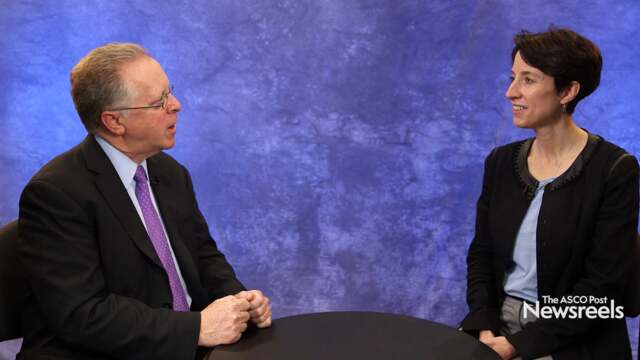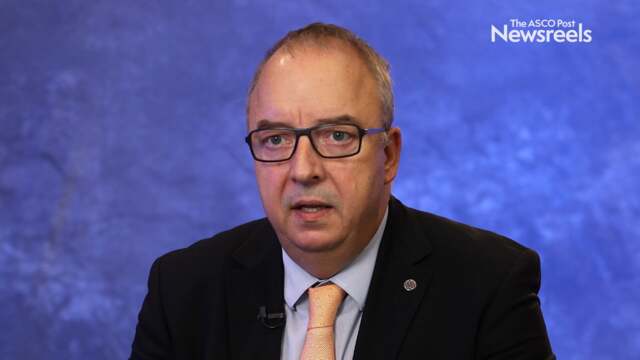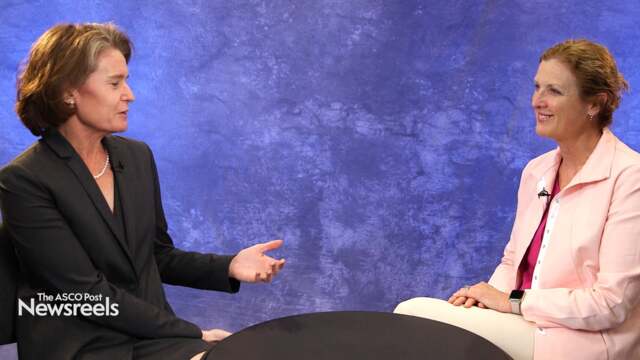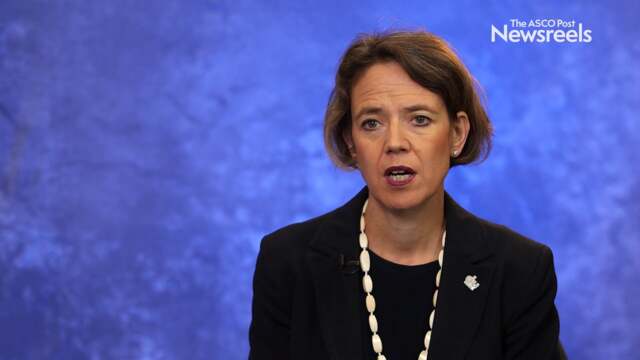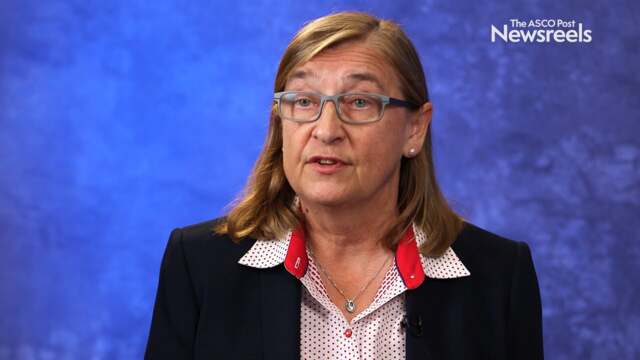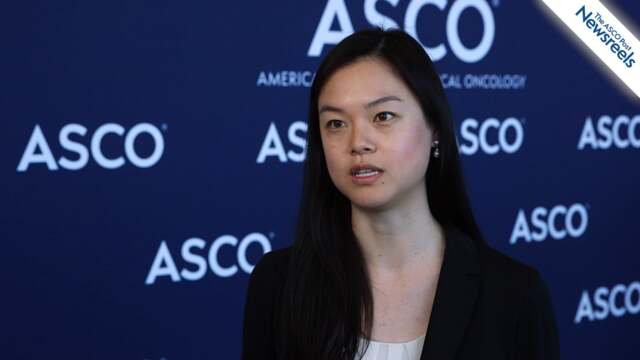Oral Taxane Shows Strong Activity and Good Tolerability in Metastatic Breast Cancer
As first-line treatment for metastatic breast cancer, the oral taxane tesetaxel produced a 45% confirmed response rate and was well tolerated, producing little alopecia or neuropathy, according to Andrew D. Seidman, MD, and colleagues from several cancer centers. Dr. Seidman, of Memorial Sloan...
FDA Expands Ribociclib Indication in Hormone Receptor–Positive, HER2-Negative Advanced or Metastatic Breast Cancer
Today, the U.S. Food and Drug Administration (FDA) expanded the indication for ribociclib (Kisqali) in combination with an aromatase inhibitor for premenopausal or perimenopausal women with hormone receptor–positive, HER2-negative advanced or metastatic breast cancer as initial...
8-Year Update of SOFT and TEXT Trials: Positive but Not Definitive
At the 2017 San Antonio Breast Cancer Symposium (SABCS), the International Breast Cancer Study Group (IBCSG) and its collaborators presented the 8-year updates of the key modern trials of ovarian function suppression after local treatment for young women with resected breast cancer.1 These updates...
Somatic Driver Alterations and Distant Recurrence in Postmenopausal Early Breast Cancer Patients Receiving Endocrine Therapy
In an analysis from the BIG 1-98 trial reported in JAMA Oncology, Luen et al found that 11q13and 8p11 amplifications were associated with an increased risk of distant recurrence among patients with postmenopausal hormone receptor–positive, HER2-negative breast cancer receiving adjuvant...
ASCO Clinical Practice Guideline Update: Systemic Therapy for Patients With Advanced HER2-Positive Breast Cancer
As reported in the Journal of Clinical Oncology by Sharon H. Giordano, MD, of The University of Texas MD Anderson Cancer Center, and colleagues, ASCO has released a clinical practice guideline update on systemic therapy for patients with advanced HER2-positive breast cancer. The guideline update...
Body Mass Index, Age, and Premenopausal Breast Cancer Risk
In a multicohort study reported by researchers from the Premenopausal Breast Cancer Collaborative Group in JAMA Oncology, Schoemaker et al found that increasing adiposity was associated with a significantly reduced risk of premenopausal breast cancer across the entire spectrum of body mass index...
Expert Point of View: Harold Burstein, MD, PhD
HAROLD BURSTEIN, MD, PhD, of Dana-Farber Cancer Institute and Harvard Medical School, where he is Associate Professor of Medicine, commented on the SANDPIPER trial during a press briefing at the 2018 ASCO Annual Meeting. PIK3 mutations are probably the most common mutation in breast cancer, and...
Study of PI3K Inhibitor Added to Fulvestrant in Advanced Breast Cancer Affirms Proof-of-Principle
IN PATIENTS with advanced breast cancer harboring a PIK3CA mutation, the addition of the PI3 kinase (PI3K) inhibitor taselisib to endocrine therapy with fulvestrant (Faslodex) significantly improved progression-free survival compared with fulvestrant alone, in the international phase III SANDPIPER...
Pooled Study Analysis Explores the Use of CDK4/6 Inhibitors in Metastatic Breast Cancer
RESEARCH TO DATE has not been able to identify a subgroup of patients with estrogen receptor–positive HER2-negative metastatic breast cancer who do not derive benefit from the addition of inhibitors of cyclin-dependent kinases 4/6 (CDK4/6) to endocrine therapy, according to a study by the U.S. Food ...
Flight Attendants May Be at Increased Risk of Breast, Skin Cancers
Flight attendants showed an elevated incidence of several types of cancer compared with the general population, according to findings published by McNeely et al in Environmental Health. “Our findings of higher rates of several cancers among flight attendants is striking given the low rates...
ASCO Clinical Practice Guideline Update: Disease Management for Patients With Advanced HER2-Positive Breast Cancer and Brain Metastases
As reported in the Journal of Clinical Oncology by Naren Ramakrishna, MD, of the University of Florida Health Cancer Center at Orlando Health, and colleagues, ASCO has released a clinical practice guideline update on disease management for patients with advanced HER2-positive breast cancer and...
IMpassion130: Atezolizumab Plus Nab-Paclitaxel in Metastatic or Locally Advanced Triple-Negative Breast Cancer
The phase III IMpassion130 study has met its co-primary endpoint of progression-free survival (PFS). Results demonstrated that the combination of atezolizumab (Tecentriq) plus nab-paclitaxel (Abraxane) as first-line treatment significantly reduced the risk of disease worsening or death in patients...
Addition of Panitumumab to Neoadjuvant Chemotherapy in Primary HER2-Negative Inflammatory Breast Cancer
In a single-center phase II study reported in JAMA Oncology, Matsuda et al found that adding the EGFR inhibitor panitumumab (Vectibix) to neoadjuvant chemotherapy produced high pathologic complete response (pCR) rates in patients with primary triple-negative inflammatory breast cancer. Study...
Trastuzumab Biosimilar vs Reference Trastuzumab in HER2-Positive Early Breast Cancer
In the phase III LILAC equivalence trial reported in The Lancet Oncology, von Minckwitz et al found similar efficacy and safety with the trastuzumab biosimilar ABP 980 vs reference trastuzumab (Herceptin) in HER2-positive early breast cancer. On local review, the risk difference and risk ratio (RR) ...
Addition of Ribociclib to Fulvestrant Improves Progression-Free Survival in HR-Positive, HER2-Negative Advanced Breast Cancer
As reported by Slamon and colleagues in the Journal of Clinical Oncology, the phase III MONALEESA-3 trial has shown significant improvement in progression-free survival with the addition of the CDK4/6 inhibitor ribociclib (Kisqali) to fulvestrant (Faslodex) in hormone receptor (HR)-positive,...
FDA Accepts Supplementary PMA for Review of BRACAnalysis CDx as a Companion Diagnostic to Talazoparib in Metastatic Breast Cancer
The U.S. Food and Drug Administration (FDA) recently accepted a supplementary premarket approval (PMA) application for BRACAnalysis CDx to be used as a companion diagnostic with the poly ADP ribose polymerase (PARP) inhibitor talazoparib. The new drug application (NDA) for...
Long-Term Results of Adjuvant Endocrine Therapy in Premenopausal Breast Cancer
In an analysis of long-term outcomes in the SOFT and TEXT trials reported at the 2018 ASCO Annual Meeting and in The New England Journal of Medicine, Francis et al found that the addition of ovarian suppression to adjuvant tamoxifen significantly improved 8-year rates of disease-free and overall...
Expert Point of View: Julie Margenthaler, MD, FACS
JULIE MARGENTHALER, MD, FACS, a breast surgeon at Washington University School of Medicine and American Society of Breast Surgeons Communications Committee Chair, highlighted the importance of exploring clinical endpoints outside of a survival advantage. “While numerous studies have shown the...
Regular Mammograms Linked to Less Aggressive Treatment in Patients With Breast Cancer
A STUDY evaluating the impact of breast cancer screening has shown that the benefits of regular mammograms extend well beyond reduced mortality. According to data presented at the American Society of Breast Surgeons (ASBrS) 2018 Annual Meeting, women with breast cancer who underwent regular...
AJCC Breast Cancer Staging System More Clinically Relevant
THE RECENTLY issued 8th revision to the American Joint Committee on Cancer (AJCC) Breast Cancer Staging System incorporates tumor biology and prognostic stage groups and thus has become more accurate and clinically relevant, according to two speakers at the 2018 Miami Breast Cancer Conference.1,2...
ASCO/CAP Clinical Practice Guideline Focused Update on HER2 Testing in Breast Cancer
As reported in the Journal of Clinical Oncology by Antonio C. Wolff, MD, of Johns Hopkins Sidney Kimmel Comprehensive Cancer Center, and colleagues, ASCO and the College of American Pathologists (CAP) have issued a clinical practice guideline focused update on HER2 testing in breast cancer....
Richard J. Bleicher, MD, FACS, Appointed Vice Chair of SSO’s Breast Fellowship Program Directors Committee
Richard J. Bleicher, MD, FACS, Professor of Surgical Oncology at Fox Chase Cancer Center, has been appointed Vice Chair of the Breast Fellowship Program Directors Committee of the Society of Surgical Oncology (SSO). In his new leadership role within SSO, Dr. Bleicher will be involved in the breast ...
Priming the Immune System: Neoadjuvant Durvalumab Plus Chemotherapy May Be Beneficial in Triple-Negative Breast Cancer
The addition of durvalumab -(Imfinzi) to anthracycline/taxane-based chemotherapy had encouraging results as neoadjuvant therapy for early triple-negative breast cancer in the randomized phase II GeparNuevo study presented at the 2018 ASCO Annual Meeting.1 The results were positive in a subgroup of...
FDA Clears Expanded Indication of Scalp-Cooling System
Paxman’s advanced scalp-cooling system has now been cleared by the US Food and Drug Administration (FDA) for use during treatment of patients with solid tumors. The system is now indicated to reduce the likelihood of chemotherapy-induced alopecia in cancer patients with solid tumors such as...
Low-Fat Dietary Intervention and Overall Survival After Breast Cancer Diagnosis
In an analysis from the Women’s Health Initiative (WHI) trial reported in JAMA Oncology, Chlebowski et al found that overall survival after the diagnosis of incident breast cancer was improved in women in the reduced-fat dietary intervention group vs control group, reflecting reduced...
FDA and EMA Accept Regulatory Submissions for Review of Talazoparib for Patients With Germline BRCA-Mutated Metastatic Breast Cancer
The U.S. Food and Drug Administration (FDA) recently accepted for filing and granted Priority Review designation a new drug application for talazoparib. The submission is based on results from the EMBRACA trial, which evaluated talazoparib vs chemotherapy in patients with germline BRCA-mutated,...
Study Finds Breast Cancer Survivors Are Not Getting Recommended Number of Mammograms Postsurgery
Breast cancer survivors are not getting the recommended level of screening postsurgery, according to a study by Ruddy et al in JNCCN–Journal of the National Comprehensive Cancer Network. The study was led by Kathryn Ruddy, MD, MPH, Director of Cancer Survivorship for the Department of...
Characteristics and Screening of Brain Metastases in Breast Cancer and NSCLC
In a research letter published in JAMA Oncology, Cagney et al found that brain metastases were more advanced and more likely to be symptomatic in patients with breast cancer compared to patients with non–small cell lung cancer (NSCLC). Current guidelines recommend magnetic resonance imaging...
ASCO Clinical Practice Guideline Focused Update: Selection of Optimal Adjuvant Chemotherapy and Targeted Therapy for Early Breast Cancer
As reported by Neelima Denduluri, MD, of US Oncology Network, Virginia Cancer Specialists, and colleagues in the Journal of Clinical Oncology, ASCO has issued a focused update on the clinical practice guideline on optimal chemotherapy and targeted therapy in early breast cancer. To develop the...
Expert Point of View: Sarah Blair, MD
SARAH BLAIR, MD, a breast surgeon at the University of California San Diego, noted that lymphedema remains a significant clinical problem, although the rates of lymphedema are decreasing, as fewer full axillary node dissections are performed. “This study utilizes bioimpedance spectroscopy, a...
Early Detection and Intervention Reduce Breast Cancer–Related Lymphedema
A NEW STUDY has found that early detection along with a simple intervention can be highly effective in preventing breast cancer–related lymphedema for at-risk women. According to data presented at the 2018 Annual Meeting of the American Society of Breast Surgeons,1 82% of women identified at an...
Expert Point of View: Judy C. Boughey, MD
JUDY C. BOUGHEY, MD, a breast surgeon and clinical and translational researcher at the Mayo Clinic, Rochester, Minnesota, said the two studies highlight the importance of discussing genetic testing with patients who are diagnosed with breast cancer. “With the advances in panel testing for...
Studies Challenge Relevance of Genetic Testing Guidelines for Breast Cancer
NEW RESEARCH suggests that current genetic testing guidelines for breast cancer are far too restrictive, excluding nearly half of high-risk patients. According to a pair of studies presented at the 2018 American Society of Breast Surgeons (ASBrS) Annual Meeting, women with breast cancer who did not ...
Expert Point of View: Carla S. Fisher, MD
CARLA S. FISHER, MD, Associate Professor of Surgery at Indiana University School of Medicine, Indianapolis, underscored the importance of these data in informing treatment decisions given the difficult trade-off patients can face. “By analyzing a large group of patients treated in the modern era, ...
Recurrence Rates After Lumpectomy Significantly Improved in Patients Receiving ‘Modern-Era’ Therapy
A STUDY OF local recurrence rates following lumpectomy has shown significant improvement in patients receiving modern, multimodal therapies, suggesting breast-conserving surgery may be an option for more patients with breast cancer, according to data presented at the 2018 American Society of Breast ...
Expert Point of View: Lisa Carey, MD, and Dawn Hershman, MD, FASCO
LISA CAREY, MD, the Richardson and Marilyn Jacobs Preyer Distinguished Professor in Breast Cancer Research at the University of North Carolina, Chapel Hill, commented as the invited discussant for TAILORx, and Dawn L. Hershman, MD, FASCO, Professor of Medicine and Epidemiology and Leader of the...
TAILORx: Endocrine Therapy Alone Is Sufficient for Most Patients With ‘Intermediate-Risk’ Breast Cancer
THE HIGHLY ANTICIPATED results of the phase III TAILORx study are in—and they indicate that the vast majority of patients with “intermediate-risk” early-stage breast cancer can forgo chemotherapy. “Our study shows that chemotherapy may be avoided in about 70% of women with hormone...
The X-Ray Era: 1901–1915
The text and photographs on this page are excerpted from a four-volume series of books titled Oncology: Tumors & Treatment, A Photographic History, by Stanley B. Burns, MD, FACS, and Elizabeth A. Burns. The photos below are from the volume titled “The X-Ray Era: 1901–1915.” The photographs...
Tai Chi for the Treatment of Insomnia in Breast Cancer Survivors
Underrecognized and inadequately managed, insomnia is a significant burden for many cancer survivors. Often persistent over several years following diagnosis and treatment, sleep problems negatively affect quality of life and elevate the risk of depression and anxiety. In this installment of The...
Andrew D. Seidman, MD, and Meredith M. Regan, ScD, on Breast Cancer: Results From the TEXT and SOFT Trials
Andrew D. Seidman, MD, of Memorial Sloan Kettering Cancer Center, and Meredith M. Regan, ScD, of Dana-Farber Cancer Institute, discuss study findings on absolute improvements in freedom from distant recurrence with adjuvant endocrine therapies for premenopausal women with hormone receptor–positive, HER2-negative breast cancer (Abstract 503).
Andrew D. Seidman, MD, and Susan F. Dent, MD, on Breast Cancer: Analysis of the SANDPIPER Trial
Andrew D. Seidman, MD, of Memorial Sloan Kettering Cancer Center, and Susan F. Dent, MD, of The Ottawa Hospital Cancer Centre, analyze the phase III study findings on taselisib plus fulvestrant vs fulvestrant in patients with estrogen receptor–positive, PIK3CA-mutant, locally advanced or metastatic breast cancer (Abstract LBA1006).
Andrew D. Seidman, MD, and Aditya Bardia, MD, MPH, on Metastatic Breast Cancer: Findings on an Antibody-Drug Conjugate
Andrew D. Seidman, MD, of Memorial Sloan Kettering Cancer Center, and Aditya Bardia, MD, MPH, of Massachusetts General Hospital, discuss the efficacy of sacituzumab govitecan for treatment-refractory hormone receptor–positive/HER2-negative metastatic breast cancer (Abstract 1004).
Michael Gnant, MD, on Breast Cancer: Results From the ABCSG-18 Trial
Michael Gnant, MD, of the Medical University of Vienna, discusses study findings on adjuvant denosumab in early breast cancer––a disease-free survival analysis of postmenopausal patients.
2018 ASCO: Neoadjuvant Use of PARP Inhibitor Shows Promise in Early-Stage, BRCA-Mutated Breast Cancer
In a small phase II study of early-stage breast cancer patients with BRCA1/2 mutations, researchers at The University of Texas MD Anderson Cancer Center found that more than half of the women who took the PARP inhibitor talazoparib once daily prior to surgery had no evidence of disease at the time...
2018 ASCO: Aromatase Inhibitor Plus Ovarian Suppression Yields Benefit in High-Risk Premenopausal Patients With Breast Cancer
Premenopausal women with hormone receptor (HR)–positive, HER2-negative breast cancer and a high risk of recurrence who are treated with an aromatase inhibitor plus ovarian function suppression may gain a 10% to 15% improvement in freedom from distant recurrence at 8 years, according to a ...
Elizabeth A. Mittendorf, MD, PhD, and Lisa A. Carey, MD, on Breast Cancer: Commentary on the TAILORx Trial
Elizabeth A. Mittendorf, MD, PhD, of Dana-Farber/Brigham and Women’s Cancer Center, and Lisa A. Carey, MD, of the University of North Carolina, discuss the impact of new phase III findings on chemoendocrine treatment vs endocrine treatment alone in hormone receptor–positive, HER2-negative, node-negative breast cancer (Abstract LBA1).
Sibylle Loibl, MD, PhD, on Triple-Negative Breast Cancer: Results From the GeparNuevo Trial
Sibylle Loibl, MD, PhD, of the German Breast Group, discusses phase II study findings on the addition of durvalumab to a taxane-anthracycline–containing chemotherapy in triple-negative breast cancer (Abstract 104).
Rebecca A. Dent, MD, on Triple-Negative Breast Cancer: Results From the LOTUS Trial
Rebecca A. Dent, MD, of the National Cancer Centre Singapore, discusses phase II study findings on first-line ipatasertib plus paclitaxel for locally advanced/metastatic triple-negative breast cancer (Abstract 1008).
Helena Margaret Earl, MBBS, PhD, on Early Breast Cancer: Results From the Persephone Trial
Helena Margaret Earl, MBBS, PhD, of the University of Cambridge, discusses phase III study findings on 6 vs 12 months of adjuvant trastuzumab in patients with HER2-positive early breast cancer (Abstract 506).
Sherry Shen, MD, on Breast Cancer and Obesity: Results of the SWOG S0927 Study
Sherry Shen, MD, of Columbia University Medical Center, discusses findings on the use of omega-3 fatty acid for obese breast cancer patients with aromatase inhibitor–related arthralgia (Abstract 10000).
